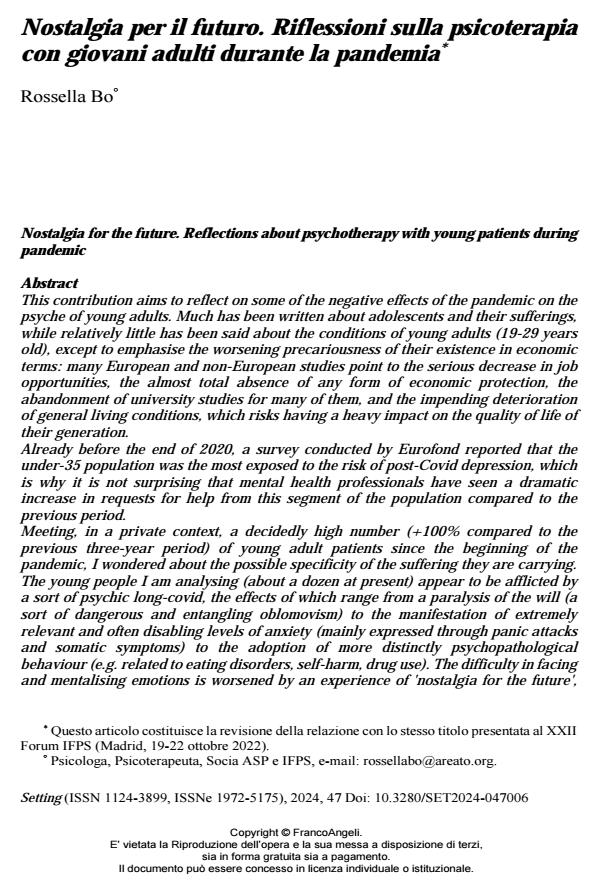Nostalgia for the future. Reflections about psychotherapy with young patients during pandemic
Journal title SETTING
Author/s Rossella Bo
Publishing Year 2024 Issue 2024/47
Language Italian Pages 9 P. 107-115 File size 164 KB
DOI 10.3280/SET2024-047006
DOI is like a bar code for intellectual property: to have more infomation
click here
Below, you can see the article first page
If you want to buy this article in PDF format, you can do it, following the instructions to buy download credits

FrancoAngeli is member of Publishers International Linking Association, Inc (PILA), a not-for-profit association which run the CrossRef service enabling links to and from online scholarly content.
This contribution aims to reflect on some of the negative effects of the pandemic on the psyche of young adults. Much has been written about adolescents and their sufferings, while relatively little has been said about the conditions of young adults (19-29 years old), except to emphasise the worsening precariousness of their existence in economic terms: many European and non-European studies point to the serious decrease in job opportunities, the almost total absence of any form of economic protection, the abandonment of university studies for many of them, and the impending deterioration of general living conditions, which risks having a heavy impact on the quality of life of their generation. Already before the end of 2020, a survey conducted by Eurofond reported that the under-35 population was the most exposed to the risk of post-Covid depression, which is why it is not surprising that mental health professionals have seen a dramatic increase in requests for help from this segment of the population compared to the previous period. Meeting, in a private context, a decidedly high number (+100% compared to the previous three-year period) of young adult patients since the beginning of the pandemic, I wondered about the possible specificity of the suffering they are carrying. The young people I am analysing (about a dozen at present) appear to be afflicted by a sort of psychic long-covid, the effects of which range from a paralysis of the will (a sort of dangerous and entangling oblomovism) to the manifestation of extremely relevant and often disabling levels of anxiety (mainly expressed through panic attacks and somatic symptoms) to the adoption of more distinctly psychopathological behaviour (e.g. related to eating disorders, self-harm, drug use). The difficulty in facing and mentalising emotions is worsened by an experience of 'nostalgia for the future', which makes it very hard to progress in the work of analysis, and for which it is often necessary to consider supportive pharmacological therapy. Starting from an analysis of the recent literature on the subject, and with the support of some clinical vignettes, we aim to focus on some of the specific aspects of the suffering experienced by young adults, which, apart from evident individual differences, presents common traits to reflect on.
Keywords: COVID-19 pandemic, psychic long covid, mentalization, nostalgia for the future, psychosomatics, young adults
Rossella Bo, Nostalgia per il futuro. Riflessioni sulla psicoterapia con giovani adulti durante la pandemia in "SETTING" 47/2024, pp 107-115, DOI: 10.3280/SET2024-047006